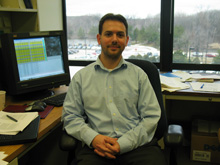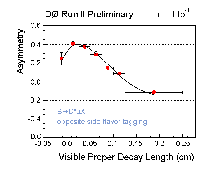 | Thursday, March 16, 2006 |
|
Thursday, March 16 11:00 am Academic Lecture Series - Curia II Speaker: R. Plunkett, Fermilab Title: Exploring the New World of Neutrino Physics – Lecture 3 2:30 p.m. Theoretical Physics Seminar - Curia II Speaker: M. Mühlleitner, CERN and LAPTH Annecy Title: Higgs Boson Production in Gluon-Gluon and Gamma-Gamma Collisions 3:30 p.m. DIRECTOR'S COFFEE BREAK - 2nd Flr X-Over 4:00 p.m. Accelerator Physics and Technology Seminar - 1 West Speaker: N. Dhanaraj, Carnegie Mellon University Title: Interfacial Fracture Testing to Investigate the Mechanics of SOFC Interconnect Alloy Durability
Friday, March 17 |
|
Extended Forecast |
Secon Level 3 |
|
Thursday, March 16 -Tomato Florentine -Grilled Chicken Cordon Bleu Sandwich -Chimichangas -Smart Cuisine -Chicken Marsala -Smoked Turkey Melt -Assorted Pizza -SW Chicken Salad w/Roasted Corn Salsa |
|
Thursday, March 16 Dinner -Skewered Shrimp -Grilled Lamb Chops -Fennell & Cannelli Bean Puree -Green Beans w/Julienne Red Peppers -Chocolate Fondue w/Fresh Fruit
Wednesday, March 22
Chez Leon Menu |
| Fermilab Today is online at: http://www.fnal.gov/today/ Send comments and suggestions to today@fnal.gov Fermilab Today archive Hurricane Relief Page Fermilab Today PDF Version Fermilab Result of the Week archive Fermilab Safety Tip of the Week archive Linear Collider News archive Fermilab Today classifieds Subscribe/Unsubscribe to |
|
Monte Carlo Tools Workshop
Scheduled for March 20-21
|
||
|
||
|
What do roulette and particle collisions have in common? The laws of chance decide--the same input can result in many different possible outcomes. In the former example, the ball can land on one of 38 possible slots; in the latter, the same kind of matter and antimatter can produce collisions that create hundreds of different possible high-energy events. Until each outcome actually occurs, it exists only as a probability.
"Monte Carlo tools are a way of simulating particle collisions in full glorious, gory detail," says Peter Skands, a theoretical physicist on the workshop organizing committee. "They take the elementary scattering process and dress it up with all the radiation, resonance decays, hadronization, and leftover beam remnants that are part of a real particle interaction." Such simulations allow scientists to make detailed comparisons between the thing they want to find (such as the signature of a Higgs boson) and the background events that may confuse such signatures. The Monte Carlo Tools for Beyond the Standard Model Physics workshop on March 20-21 will focus on some of the most exotic possibilities for new physics that theorists consider today. The agenda spans over extra dimensions (your choice of warped, straight, or universal), top partners, and Higgsless models, among others. "I think at the moment we are well prepared to deal with supersymmetry (SUSY); however, that's just one idea among many for what might be lurking there at the Terascale. If it's not SUSY but something else, you want to know you're prepared for it," says Skands. "As the Tevatron collects more luminosity and the LHC approaches, it's important to ask: Are our theoretical descriptions sufficiently accurate? How precisely can the parameters of the new physics be measured? To do this reliably, you need Monte Carlo simulations." Web registration is now closed but people can register onsite the day of the
workshop. The program is available on the workshop Web page.
|
Students Connecting Science and Cyberinfrastructure
| ||
|
What's the best way to expand the scientific reach of grid computing and cyberinfrastructure beyond big international projects? At Florida International University, leaders of the CyberBridges project are betting on cyberinfrastructure-trained students as a way to integrate advanced technology into university research.
The goal of the CyberBridges program, now in its pilot year, is to bridge the divide between the cyberinfrastructure community and different scientific disciplines by giving students the opportunity to explore applications of these new technologies within their domains. The program would eventually create a new generation of scientists and engineers who approach scientific problems in a new way.
|
|
MSNBC, March 16, 2006: Take the Science and Space Quiz
Scientists can do many things: Find liquid water in another part of the galaxy, put a new spacecraft in orbit around Mars and solve the mystery of an odd squirrel-like rodent. But can they help you win the March Madness pool at work? While you're considering all the mathematical possibilities, take our weekly science and space quiz and don't forget to salute the mighty Ant Farm.
|
| The magical mix of B mesons |
|
A peculiar and extremely important property of neutral B mesons is that
they can spontaneously transform themselves into their own
anti-particles. This phenomena, known as flavor oscillations or mixing,
has been measured in the Bd system (a bound state of a b-antiquark and
a d-quark), but remains to be observed for Bs mesons (b-antiquark and
s-quark bound states), which oscillate at a much faster frequency. One of
the major goals of the DZero experiment is to measure the Bs
oscillation frequency, a measurement which will provide a crucial test
of our understanding of the weak interaction.
In order to see if a B meson has mixed, one must determine its flavor (whether or not it is a particle or antiparticle) at both the time it was produced and when it decayed. Its flavor at decay time is determined by the charge of its decay products. Since b-quarks and b-antiquarks are always produced in pairs in collisions at the Tevatron, the B meson's flavor at production can be determined by a partial reconstruction of its partner b-hadron in the event. DZero has used their samples of hundreds of thousands of reconstructed B mesons to optimize and calibrate this opposite side flavor tagging procedure. Its performance, called the tagging power, is characterized by the equivalent fraction of events with correct definition of flavor. DZero determines the tagging power of their opposite sign flavor tagging algorithm to be epsilonD2 = 2.48+-0.22 percent.
DZero has measured the Bd oscillation frequency using opposite-side
flavor tagging and their result is consistent with the world average of
this value. This is a critical step in the search for Bs mixing as the
same flavor tagging procedure will be used. Look for an updated result
on this important measurement from DZero soon. |
| Result of the Week Archive
|
|
Fermilab Special for Bulls Tickets:
English Country Dancing
|



